READER COMMENTS ON
"Letter Queries Rumsfeld About U.S. Military Attacks Prior to Approval of War on Iraq"
(60 Responses so far...)
COMMENT #1 [Permalink]
...
Jerry O'Riordan
said on 5/31/2005 @ 4:15 pm PT...
Hey, Dubya, what have you been smokin'?
W, invaded any countries lately?
COMMENT #2 [Permalink]
...
ewastud
said on 5/31/2005 @ 4:26 pm PT...
I wonder how close Conyers is to having the 100,000 signatures already? Anybody heard? I hope Conyers's action gets the attention it deserves from the rest of the House membership and the MSM.
COMMENT #3 [Permalink]
...
Grizzly Bear Dancer
said on 5/31/2005 @ 4:36 pm PT...
Go Johnny Go! Sorry for attacking trolls to colorfully in recent posts. I'l try and refrain from that sort of language usage.
COMMENT #4 [Permalink]
...
Brad
said on 5/31/2005 @ 4:42 pm PT...
Ewastud - A story just out at RAW, puts the number of visitors to the letter at 59,000 over the holiday weekend alone. Unclear if all of them signed it or not, but it's a very good sign considering the fact that Weekend traffic is usually about a fifth of normal traffic. And Holiday Weekends are even slower!
COMMENT #5 [Permalink]
...
Judith Simpson
said on 5/31/2005 @ 4:43 pm PT...
Thank God for Congressman Conyers! I think he should run for president. I'm going to start contributing to him regularly. I've been hearing that the Democratic Party is having trouble fundraising. If they'd follow Congressman Conyers' example, the bucks would probably pour in. When will they get a clue!
COMMENT #6 [Permalink]
...
Dredd
said on 5/31/2005 @ 4:46 pm PT...
Thanks again Congressman Conyers!
COMMENT #7 [Permalink]
...
Mary
said on 5/31/2005 @ 5:26 pm PT...
We should all make a donation to Conyers...that may wake up the rest of the dems. It may send a message that we will not stand for more war...and please figure out a way to get out of Iraq. We are the problem not the solution. Thank you John Conyers for trying.
COMMENT #8 [Permalink]
...
Bryant L Trent
said on 5/31/2005 @ 5:32 pm PT...
Thanks so much CONGRESSMAN CONYERS!! 

COMMENT #9 [Permalink]
...
Blackdog
said on 5/31/2005 @ 6:00 pm PT...
Conyers is a hero to me. I respect him and support him. I only wish more in the Congress were of his quality.
COMMENT #10 [Permalink]
...
Mike in Chicago
said on 5/31/2005 @ 6:36 pm PT...
As usual, this story was not in any of the Chicago MSM papers...not one word...and I did not see it on CNN or MSNBC. Anybody surprised?
COMMENT #11 [Permalink]
...
Donald E. Anctil
said on 5/31/2005 @ 6:42 pm PT...
Although you show an abormal level of arrogance, and will be inclined to dismiss the request of Congressman Conyers, I believe that there will be no end to the questions until you are forced to answer honestly to what you knew and when you knew it. It is obvious that you do not lose a moment of sleep over the peril to our armed forces that your actions and lies have brought about.
COMMENT #12 [Permalink]
...
Peg C
said on 5/31/2005 @ 7:14 pm PT...
Unbelievable!
At the conclusion of the trial of Pablo Paredes, the Navy seaman who refused to join his ship because he felt the war was illegal, the military judge issued this statement:
"I believe the government has just successfully proved that any seaman recruit has reasonable cause to believe that the wars in Yugoslavia, Afghanistan and Iraq were illegal."
Link here
COMMENT #13 [Permalink]
...
Bejammin075
said on 5/31/2005 @ 7:43 pm PT...
The Democrats need a SERIOUS kick in the ass. My frustration with them is reaching new levels I thought were not possible. I just checked the DNC website to see if there was a word about the Downing Street Memo. Nothing. What...the...fuck?? Do they fight for anything? They let Republicans own and program all the secret software that programs the vote, and now there is clear evidence the President lied us into war, and again, they do nothing. How can a party this big have no instinct for self preservation?
I sent the following email to the DNC, and I'll say as much on the phone tomorrow (202-863-8000 - I think 6 or 7 of us should call).
Bush lied about Iraq - where the hell is the DNC?
A Gallup poll done in late April (link below) shows that 50%, I REPEAT, FIFTY PERCENT, of Americans believe that Bush "deliberately misled" (that's polite for "lied") us into Iraq. I bet that 50% of America is overwhelmingly on the Left side of the aisle. Now that there is smoking gun evidence that the entire Iraq policy was lies (the 5/1/05 publication of the Downing Street Memo in the London Sunday Times) that backs up everything the "Bush lied" folks ever said, I humbly ask you:
WHERE THE HELL ARE THE DEMOCRATS?!?!
Who is representing the 50% of Americans who know the truth - that Bush lied?
Who is representing the 100% of Americans that Bush lied to?
Who is representing the 100% of the 15,000 US soldiers with their faces blown off, their arms blown off, their legs blown off, who Bush lied to?
Who is representing the families of our fallen soldiers, of which, 100% were lied to by Bush?
Who is representing the 100% of tax payers who were lied to by Bush?
Who is representing the 100% of voters who were lied to by Bush?
Who is fighting to restore the dignity and honor of America, now that we've slain 100,000 innocent Iraqi's with our bombs and built concentration camps all over the world?
Except for Representative John Conyers and a handful of others, I hear thunderous silence from the Democratic party. WHO DO YOU REPRESENT ?!?!
http://www.editorandpubl...nu_content_id=1000894970
COMMENT #14 [Permalink]
...
VeryWorried
said on 5/31/2005 @ 7:49 pm PT...
Peg #12, now that is an historical turning point! Bush's wars have been declared illegal in an American military court!
I may have to change my username sooner than expected.
COMMENT #15 [Permalink]
...
Chris Racanelli
said on 5/31/2005 @ 7:59 pm PT...
My hat comes off for Congressman Conyers. We must continue until the truth is known.
COMMENT #16 [Permalink]
...
kira
said on 5/31/2005 @ 9:11 pm PT...
Stripping Rumsfeld and Bush of Impunity
May 31, 2005
Two respected human rights groups say there is prima facie evidence against Donald Rumsfeld and George W. Bush for war crimes and torture --- and they're asking foreign governments to do something about it.
COMMENT #17 [Permalink]
...
Jay Johnson
said on 5/31/2005 @ 9:19 pm PT...
Conyers for Prez! This man reflects the direction we need to take.
JJ
COMMENT #18 [Permalink]
...
Winter Patriot
said on 5/31/2005 @ 9:50 pm PT...
Bejammin075 (#13) I could not agree with you more.
COMMENT #19 [Permalink]
...
LuckyMama
said on 5/31/2005 @ 10:42 pm PT...
Bejammin075 (#13), your letter is brilliant!!!! Why doesn't the DNC put you in charge of leading the "fight"?
COMMENT #20 [Permalink]
...
Bejammin075
said on 5/31/2005 @ 10:52 pm PT...
Luckymama #19. I don't know. My guess is it would lower corporate profits. They've done very well getting Dean instead of the last guy (who always seemed like a shifty car salesman/dirty lawyer type). Dean is one of the few people I'd believe is being silent (for now) as part of a legitamate strategy. The others, like Kerry, feed us just enough lip service that Dems won't bolt for the Green party, but doesn't deliver any action or political capital to back it up.
COMMENT #21 [Permalink]
...
Peg C
said on 5/31/2005 @ 11:26 pm PT...
I'm sorry; I still hold this vision of Kerry/Edwards waiting behind the curtains, ready to pounce with lots of evidence. Both families were threatened after November 2. And both of them made promises to us that I'm fairly sure they intend to keep.
COMMENT #22 [Permalink]
...
Horkus
said on 5/31/2005 @ 11:37 pm PT...
Who's that fuzzy guy in the forefront?
Must be some kind of fuzzy math thing.
COMMENT #23 [Permalink]
...
Peg C
said on 5/31/2005 @ 11:55 pm PT...
This mockup is gorgeous - do NOT miss it!
THE NEWS
COMMENT #24 [Permalink]
...
uburamba
said on 6/1/2005 @ 5:45 am PT...
I think it is time to get all the progressive and grassroots organizations to organize a million person march on Washington for impeachment. I think the singular focus should be on this issue, and it should not be diluted by addressing at this time other crimes commited by this administration. We need to pressure Congress on this one issue.
COMMENT #25 [Permalink]
...
Robert Lockwood Mills
said on 6/1/2005 @ 6:13 am PT...
Peg C.: I know you trust Kerry/Edwards. But what are these promises you refer to that they intend to keep? I don't remember them.
I've gotten a hundred e-mails from Kerry since the election, and they've dealt with everything EXCEPT THE ELECTION. I reply, "Please talk about the election," and they come back with, "Robert, I know you are concerned about Social Security."
I'm concerned about two stolen elections, first and foremost! If elections can be stolen, no other issue matters...because the G.O.P. can always claim a mandate, whatever the polls say and however the public feels about a given issue.
COMMENT #26 [Permalink]
...
GWN
said on 6/1/2005 @ 6:43 am PT...
Peg C, it seems the site The News has been deleted
it says, "The post you selected no longer exists. It may have been recently deleted."
COMMENT #27 [Permalink]
...
BUSHW@CKER
said on 6/1/2005 @ 7:42 am PT...
FOX story on Drowning Street Memo!
COMMENT #28 [Permalink]
...
America's Work Stories
said on 6/1/2005 @ 7:55 am PT...
COMMENT #29 [Permalink]
...
Bejammin075
said on 6/1/2005 @ 8:52 am PT...
Peg C #21
Kerry started working on his campaign for 2008 on 11/3/04. Kerry and Edwards don't have any plans to jump out of the election fraud closet, or the "bush lied" closet, with reems of evidence. Kerry will keep walking the fine line that can't be walked with credibility. Maybe once a vast majority of Americans all scream "Impeachment" simultaneously, Kerry will dip his toes in the water, but not until then. He's passed too many opportunities to fight back. He's in a perfect position to know Bush lied, because he's on the Senate committee(s) that deal with intelligence. Kerry, like much of the establishment Dems, is a silent enabler of the Bush administrations crimes. Kerry had a hundred opportunities to say Bush manipulated intelliegence, but I don't think he did, or he did it in vague secret code. Kerry would only go so far as to say that Bush made strategic blunders, like not training enough Iraqis, or Tora Bora, etc. To me it almost seemed like Kerry was a closet hawk, the way he walked the line. It sounds harsh, but that's what I belive.
COMMENT #30 [Permalink]
...
Dredd
said on 6/1/2005 @ 9:50 am PT...
Maybe the fact that deep throat has outted himself (link here) will give some others the idea to leak the truth(link here).
COMMENT #31 [Permalink]
...
Grizzly Bear Dancer
said on 6/1/2005 @ 11:52 am PT...
New FAIR Presidential Election this November. No electronic voting machines. No more votes counted by private voting companies in secrecy which donated money to the Bush Cheney reelection campaign . Paper ballot trails and all the other valid changes that legitimate voter rights groups support such as limiting corporate contribution, 3 candidate debates, outlaw political television commercials and list the way political candidates voted seeking reelection in all major media publications. John Conyers Jr for President. Understand that there are Democrats in it with the Republicans. Each elected representative must stand alone on their own Congression voting record. To Mike in Chicago COMMENT #10: Even with the history of fixed elections in Chicago, it is utterly disgusting the way the newspapers which are owned by the wealthy and controlled by the government (although they of course claim otherwise) have so obviously dropped the ball and have not told the truth to Chicagoans about the last 2 rigged Presidential Elections/Lying Murderers in Iraq story or completely burried it from the front page or any pages of the Chicago Sun Times and the Chicago Tribune. All willing to proliferate the lies of the Bushit Regime. Least you take note of the 400 envionmental standards or laws which were lowered or reversed by our current government. The Environemental Protection Agency changed it's name to "The Agency" now because they do not protect the environment anymore. Lastly, look at the changes our Congress of Robots have passed like the Patriot Act and the new bankrupcy Act for example against the American people always in favor of big business. It is the responsibility of concerned Citizens to take back their government and take back their country.
COMMENT #32 [Permalink]
...
Peg C
said on 6/1/2005 @ 12:07 pm PT...
The intenet is being interrupted. I object. Don't we all? Come ON, everyone !!! We need to rally NOW!!! Where is the outrage?
COMMENT #33 [Permalink]
...
VeryWorried
said on 6/1/2005 @ 12:11 pm PT...
Slightly OT. I stumbled across the Daily Breeze (a Southern California newspaper) from May 25, 2005 that has "U.S. troops' deaths rising in Iraq" on its front page.
Four American casualties bring total to 14 in three days. Attacks have also killed 60 Iraqis. "Civil war" is reported in Tal Afar.
COMMENT #34 [Permalink]
...
MrBlueSky
said on 6/1/2005 @ 12:15 pm PT...
The task that we should focus on is to educate the public about the crimes being committed in the White House and Pentagon.
Then, the MSM will start to pay attention.
Brad, is there any way you can "amplify" your reach on your Brad Show? We need to get on major radio stations nationwide.
Does anyone have a contact with George Soros? He could be the deep pockets Brad will need to get this message out to the country.
Time for action, people!
COMMENT #35 [Permalink]
...
Valley Girl
said on 6/1/2005 @ 12:26 pm PT...
OT but does anyone know of a site that provides a listing House and Senate votes, by member, on individual resolutions etc. , and even of signatories of letters (e.g. who are the 88+ signing Conyers' letter)?
Every time I read something like "was voted for by 138 Dems and X Repubs" (exit strategy in Iraq) I find myself wanting to know who voted, and how.
So far, I haven't found a quick way to get that information.
Thanks if you can help.
COMMENT #36 [Permalink]
...
Grizzly Bear Dancer
said on 6/1/2005 @ 12:26 pm PT...
COMMENT #32 Correction: Bob Khoeler is a writer at the Chicago Tribune who has written articles about the Fraudulent Presidential Election in 2004 in which George W. Bush and Dick Cheney CHEATED however, the Chicago Tribune won't print them so you have to go to his Common Wonders website to read his words.
COMMENT #37 [Permalink]
...
Robert Lockwood Mills
said on 6/1/2005 @ 12:34 pm PT...
To Dredd: I was thinking the same thing about Deep Throat. Apparently his family needs money, and they want to write a book; but the tenor of the times might also be a factor. The front-page article in the New York Times used the word "hero" a bunch of times to describe him.
Gordon Liddy and Pat Buchanan said Deep Throat should have gone through "channels" instead of calling a newspaper...as if Nixon wouldn't have chopped the head off of anyone within those channels. It helps to know you have the right people against you.
Just could be the trigger for an Inside-the-Beltway type to call Woodward and Bernstein.
COMMENT #38 [Permalink]
...
Grizzly Bear Dancer
said on 6/1/2005 @ 12:38 pm PT...
Comment #35 Congressional accountability or any political office accountability in other words how an elected official voted on an issue is a generally a best kept secret from the American votering public. Maybe Brad can offer a suggestion on gaining accessabilty to this sacred information.
COMMENT #39 [Permalink]
...
Dredd
said on 6/1/2005 @ 12:41 pm PT...
Peg C #12 That is a really interesting case. Good link.
The judge may be criticized by DeLay like some of the others who have stood up to the neocon madness have been.
Its getting to be an honor to be critized by DeLay because if you are criticized by DeLay you know you are doing something right.
COMMENT #40 [Permalink]
...
kira
said on 6/1/2005 @ 12:47 pm PT...
COMMENT #41 [Permalink]
...
Hannah
said on 6/1/2005 @ 12:49 pm PT...
COMMENT #42 [Permalink]
...
Dredd
said on 6/1/2005 @ 12:58 pm PT...
RLM #37
Congressman to introduce resolution commending Deep Throat. Developing... is a headline over at The Raw Story.
This too should help others to come out of the closet and tell the truth. They are in the FBI, CIA, and Homeland Security.
They know some of the lies of the president, vice president, and the cabinet.
Whistleblowers unite! Whistleblowers rise up!
COMMENT #43 [Permalink]
...
Jerry O'Riordan
said on 6/1/2005 @ 1:28 pm PT...
Deep Throat!!! Now more than ever!
COMMENT #44 [Permalink]
...
Charles Dubord
said on 6/1/2005 @ 1:30 pm PT...
COMMENT #45 [Permalink]
...
Valley Girl
said on 6/1/2005 @ 1:40 pm PT...
#40 Kira- good. My Dem Rep-- John Lewis, signed. I wonder if he might the only Dem. House member who hasn't even had a Rep. challenger for the past xx elections!
#41 Hannah
Thanks for the Senate site on the roll call votes. I checked it out. Very helpful.
I stripped the link and also found the House site for roll call votes. However, it doesn't give information as to the content of amendments.
http://clerk.house.gov/evs/2005/ROLL_200.asp
Ironically (?), the HR header includes this information:
"as compiled through the electronic voting machine".
#38 GBD
Maybe Brad could add a section to BB "Check on your Congressional Representatives" with these links, or, other links that might be even better.
Thanks all.
COMMENT #46 [Permalink]
...
Valley Girl
said on 6/1/2005 @ 1:47 pm PT...
#44 Charlie
Thanks for that too. I hadn't seen your response when I commented (#45).
Again, a section with these links would be a good addition to the BB site, IMHO.
COMMENT #47 [Permalink]
...
JCB
said on 6/1/2005 @ 3:53 pm PT...
a quote from Rumsfeld on Deap Throat.
"I think that any time wrongdoing occurs it's important that wrongdoing be reported, and I think that's appropriate," he said when asked about his reaction to the news.
COMMENT #48 [Permalink]
...
mugzi
said on 6/1/2005 @ 4:22 pm PT...
Poppy wants Jeb for next Prez. Any doubt???? ALL energies need to be spent on the rigged elections - both!!
COMMENT #49 [Permalink]
...
Arry
said on 6/1/2005 @ 5:25 pm PT...
Peg C #12 - I had to blink, kind of rub my eyes when reading that article. Yes. it really said what it said. Reasonable cause to believe illegal.
Good things come in threes. The Amnesty International statement has thrown the administration into a tailspin. It was a solid blow to them, obviously.
The French vote on the European Union was the third recent good thing and relates to why the Democrats - or DNC -are so inert. I think we are witnessing (and participating in, no doubt) an inevitable clash and failure to mutually understand and communicate between those who haven't come to terms with the built-in contradictions between the hopeful vision and the brute realities in the corporate and globalization worldview and those who say enough is enough, we have to rethink this.
This is my favorite blog, by the way, but I live out in the sticks with a slow dialup modem and when I connect to Brad Blog I usually have time to shuffle a few papers, take a short nap, etc. so I haven't posted much. (But you all do just fine!)
COMMENT #50 [Permalink]
...
Winter Patriot
said on 6/1/2005 @ 5:52 pm PT...
re #49: Thanks, Arry. Read us when you can, and post when you can too. It's always good to hear from you.
COMMENT #51 [Permalink]
...
Peg C
said on 6/1/2005 @ 6:43 pm PT...
Arry #49 -
Welcome from another "sticks-dweller!" Isn't slo-o-o-ow-speed infuriating! I guess I'm just either masochistic or addicted, or both, though - because I can't stay out of the fray. Also, I keep a cribbage game going for those "waiting times."
Yup, there sure is a LOT we need to rethink...
COMMENT #52 [Permalink]
...
Brad
said on 6/1/2005 @ 10:03 pm PT...
Valley Girl - When looking up Amendments (presuming you have the number), use http://thomas.loc.gov
And yes, want more BRAD SHOW? Call your local affiliates and ask for "BRAD SHOW via RAW RADIO" from the IBCRadio Network! (IBCRadio.com)
It wouldn't bother me at all if you guys organized to target one station at a time either...hmmm...
COMMENT #53 [Permalink]
...
Peg C
said on 6/1/2005 @ 10:59 pm PT...
Brad -
Which station would you be referring to?
COMMENT #54 [Permalink]
...
Dredd
said on 6/1/2005 @ 11:35 pm PT...
Mugzi #48 Indeed.
Black Box Voting has shown that the certification board/authority has let the Deibold design go thru even tho it violates federal law (link here).
COMMENT #55 [Permalink]
...
Valley Girl
said on 6/2/2005 @ 5:21 am PT...
# 49 #51
I have dial-up too. Are you using the Firefox browser? It's much faster than others, and free to download. Check on recent security problems, however, before you start using it- I think these have been solved, but I'm not sure.
#52 Brad
Thanks for link to thomas.loc.gov
COMMENT #56 [Permalink]
...
Kyle
said on 6/2/2005 @ 7:43 am PT...
Quote:
Peg C #21
Kerry started working on his campaign for 2008 on 11/3/04. Kerry and Edwards don't have any plans to jump out of the election fraud closet, or the "bush lied" closet, with reems of evidence. Kerry will keep walking the fine line that can't be walked with credibility. Maybe once a vast majority of Americans all scream "Impeachment" simultaneously, Kerry will dip his toes in the water, but not until then. He's passed too many opportunities to fight back. He's in a perfect position to know Bush lied, because he's on the Senate committee(s) that deal with intelligence. Kerry, like much of the establishment Dems, is a silent enabler of the Bush administrations crimes. Kerry had a hundred opportunities to say Bush manipulated intelliegence, but I don't think he did, or he did it in vague secret code. Kerry would only go so far as to say that Bush made strategic blunders, like not training enough Iraqis, or Tora Bora, etc. To me it almost seemed like Kerry was a closet hawk, the way he walked the line. It sounds harsh, but that's what I belive. Unquote
Hear, hear: For nigh on a year I listened every single day (web, radio, tv, and 24/7 news channels) to anything and everything about Kerry. My conclusions: He's a political fraud. He's got that disease all well-meaning souls seem to inhale on arrival and induction into Washington and (see Barak Obama) and whose name I wish someone would articulate.
He might have been courageous in Vietnam, but in Washington, for the little folks, he ain't. Like so many Dems today he actually seems to be a passive Republican, don't listen to his words, look at his deeds! I finally gave up on him after the "10,000" lawyers he'd organised to deal with possible election shenanigans failed to materialize on any stage (Ohio, New Mexico, et al) and he was absolutely silent on the issue. You're right, when he could fight he didn't, heck, even I amassed more factual stuff about Bush and the Bushites than he EVER quoted or used in his own material.
My personal feeling is that John Edwards was gagged by Kerry et al but maybe that's just wishful thinking on my part. As for the DNC? They finally convince me there is NO effective difference (save accents) between them and the GOP. Look at the voting on Iraq, 9/11 investigations, and the elections??!??! It's so weird I think the truth is staring us in the face but we haven't the wit to see it. As a buddy of mine says: Too there to be seen.
COMMENT #57 [Permalink]
...
Dredd
said on 6/2/2005 @ 8:37 am PT...
There must be some compelling reason for the obvious to be ignored by just about every politician other than Conyers and the progressive blogosphere. And of course the MSM is mum.
My own current theory is that all this secrecy they have become so very fond of lately, and have united to keep it from us, is the PEAK OIL syndrome (link here, and here).
Something big and major behind the scenes is keeping almost everyone but Conyers quiet. Peg C thinks it is a plan to spring the evidence on the criminal neocons. As good an idea as any.
But remember that these are very wealthy folk whose continuation is threated by the advent of PEAK OIL because they have the most to loose.
I think they are scared because the western world faces its greatest disaster and the empire will go down regardless. So they knee jerk it and go militant and begin to grab up all the oil they can.
Iraq was taken because of the oil, Afganistan because of the pipeline, yada yada. Other nations joined in for reasons other than what has been spoon fed to us by the MSM.
Meanwhile they tell us all is fine. We know damn well things are not fine and wonder why all the capitulation, militantcy, unilateralism, and lies.
I think it could very well be that the PEAK OIL reality is going to rock their world and they are desperately, even now, trying to prevent it.
They will continue these inexplicable machinations behind the scenes and lie to us in the MSM hoping they will find some solution.
The greatest commandment in the consumer religion they have created is "Thou shalt not take me out of my comfort zone", and they are trying to lie their way thru it so as not to violate that commandment.
COMMENT #58 [Permalink]
...
czaragorn
said on 6/2/2005 @ 10:01 am PT...
Peg #12, thanks for the great link! Peg #53, WERU seems a good candidate to me...
COMMENT #59 [Permalink]
...
Kyle
said on 6/2/2005 @ 10:54 am PT...
Hey Dredd: "COMMENT #57 [link]
...Dredd said on 6/2/2005 @ 8:37am PT..." Very interesting line of thought about something brewing, can you follow up on it by sharing some more of your thoughts?
I don't quite agree with only the Peak Oil motivation, though it's clearly rattling the cages of many. I think the reality is dirtier and more complex than oil alone, and includes that tail-wagging-the-dog called US Middle-East policy known as AIPAC and the Israeli government (AIPAC is the second most influential lobbying group in America after the one representing the senior (grey power) folks).
There's also the reality of some 14-to-17 (depending on which source is cited) permanent major American bases being constructed RIGHT NOW with your tax dollars in Iraq. So much for leaving Iraq when the mission is accomplished: the mission is about permanent military presence in the middle-east to do what we do for Israel, to guarantee (somehow, they dream) a permanent oil supply, and, oh, of course, as a demonstration of the power and purpose of the last great superpower.
It's never going to happen. The trouble with all of these chaps is that it seems that not a one of them reads, understands, or takes to heart History. In a sense, I think that's very good for us. It's good for us 'cause if they could see what's coming down they would make things all the worse though it won't change the final outcome worth a damn. It's very bad for us 'cause we may very well have to deal with the most terrible of consequences before we or our descendants make their way back to sanity.
Keep writing, your ideas are very interesting!
COMMENT #60 [Permalink]
...
Dredd
said on 6/2/2005 @ 1:05 pm PT...
Kyle #59
Keep in mind that some people are charged with projecting events years in advance. Yes "prophecy" is not just for religion. As a matter of fact it is a do or die proposition.
Computer models exist for projecting the impact certain events, eventualities, and realities will bring upon us.
The scientest Dr. M.K. Hubbert (link here) was brilliant. But he was not liked because he violated the great commandment I mentioned in post #57 and told the US in 1956 that it would reach PEAK OIL in 1970.
It did. And the reality of that has great implications. But the scientific knowledge and the great import of that knowledge has done what? Made us more careful, more conservative with resources, and the like? Not at all. In fact the opposite is more true.
He also predicted that the world would reach PEAK OIL in the year 2000. Studies are still being done but the growing community of scientists are beginning to see he was very close.
It is important to also understand that the denial nations are going thru is symptomatic. What it means is that behavior around economies is akin to junkies. The behavior is exactly like heroin junkies, and think about what a junkie will do to keep his habit going. Can they be dangerous?
And think about what would happen to you if you threatened to cut a strong, well armed, and very serious junkee off. Think he would laugh it off if you said "you gotta go cold turkey"?
The point is that the oil companies are in a better position to be in the know about PEAK OIL. And they learned it years ago and planned to take over the US government and now have done so.
The fact that the Secretary of State, President, Vice President, and others in the admin, have ties to big oil is no accident.
The fact that big oil companies are composed of ex-pentagon, ex-cia, and ex-governmental people is no accident either.
The Swenson Curve is more science which shows there are going to be changes (link here). Even under the absolutely best scenarios where every nation and citizen cooperates.
Our government is adopting a preemptive strike policy and is preparing attack plans against many nations. These are being put in place.
Under that scenario The Swenson Curve ends up in the severe deprivation area.
A junkie deprived of smack is dangerous. No telling what they will do to all of us. One thing we know is that they will lie to us and torture people even way before the cat is out of the bag.
 In regards to what John Conyers over the weekend reportedly described as "the smoking bullet in the smoking gun", a letter has just been sent to Secretary of Defense, Donald Rumsfeld, asking questions about the recent reports that the U.S. and U.K. stepped up their air attacks in the Iraqi "No-Fly-Zone" prior to the war in "an attempt to provoke Saddam Hussein into giving the allies an excuse for war." A draft version of Conyers' letter was published over the holiday weekend by RAW STORY.
In regards to what John Conyers over the weekend reportedly described as "the smoking bullet in the smoking gun", a letter has just been sent to Secretary of Defense, Donald Rumsfeld, asking questions about the recent reports that the U.S. and U.K. stepped up their air attacks in the Iraqi "No-Fly-Zone" prior to the war in "an attempt to provoke Saddam Hussein into giving the allies an excuse for war." A draft version of Conyers' letter was published over the holiday weekend by RAW STORY.

 Sunday 'Close Enough' Toons
Sunday 'Close Enough' Toons A Pretty Weak 'Strongman': 'BradCast' 10/30/25
A Pretty Weak 'Strongman': 'BradCast' 10/30/25 'Green News Report' 10/30/25
'Green News Report' 10/30/25
 Proposal for 'First Politically Viable Wealth Tax' Takes Shape in CA: 'BradCast' 10/29/25
Proposal for 'First Politically Viable Wealth Tax' Takes Shape in CA: 'BradCast' 10/29/25 Monster Storm, Endless Wars, Gamed Elections:
Monster Storm, Endless Wars, Gamed Elections: 'Green News Report' 10/28/25
'Green News Report' 10/28/25 Let's Play 'Who Wants
Let's Play 'Who Wants Sunday 'Cartoonists Dilemma' Toons
Sunday 'Cartoonists Dilemma' Toons Exiled NOAA Scientists Resurrect Critical Disaster Database: 'BradCast' 10/23/25
Exiled NOAA Scientists Resurrect Critical Disaster Database: 'BradCast' 10/23/25  'Green News Report' 10/23/25
'Green News Report' 10/23/25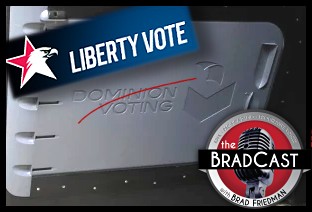 Trump-Allied GOP Partisan Buys Dominion Voting Systems: 'BradCast' 10/22/25
Trump-Allied GOP Partisan Buys Dominion Voting Systems: 'BradCast' 10/22/25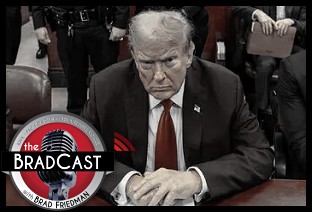 Trump, Republican Law(lessness) & (Dis)Order: 'BradCast' 10/21/25
Trump, Republican Law(lessness) & (Dis)Order: 'BradCast' 10/21/25 'Green News Report' 10/21/25
'Green News Report' 10/21/25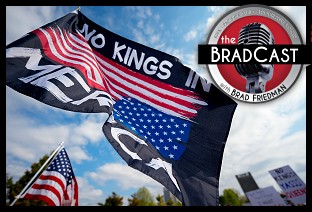 Celebrating 'No Kings': 'BradCast' 10/20/25
Celebrating 'No Kings': 'BradCast' 10/20/25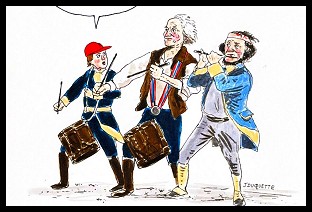 Sunday 'How It Started' Toons
Sunday 'How It Started' Toons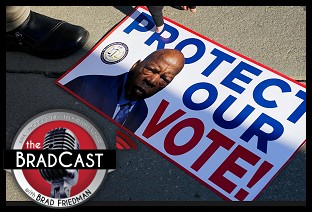 SCOTUS Repubs Appear Ready to Gut Rest of Voting Rights Act: 'BradCast' 10/16/25
SCOTUS Repubs Appear Ready to Gut Rest of Voting Rights Act: 'BradCast' 10/16/25 'Green News Report' 10/16/25
'Green News Report' 10/16/25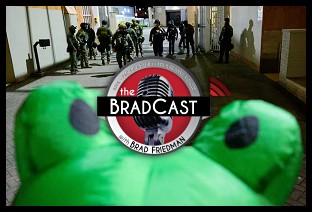 The 'Epstein Shutdown' and Other Autocratic Nightmares: 'BradCast' 10/15/25
The 'Epstein Shutdown' and Other Autocratic Nightmares: 'BradCast' 10/15/25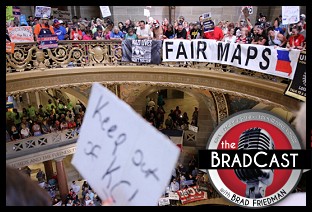 Group Vows to Block MO's GOP U.S. House Gerrymander: 'BradCast' 10/14/25
Group Vows to Block MO's GOP U.S. House Gerrymander: 'BradCast' 10/14/25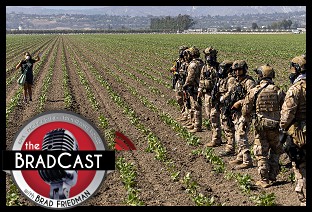 Trump Labor Dept. Warns Trump Policies Sparking Food Crisis: 'BradCast' 10/9/25
Trump Labor Dept. Warns Trump Policies Sparking Food Crisis: 'BradCast' 10/9/25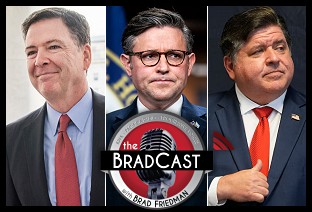 Trump's Losing Battles: 'BradCast' 10/8/25
Trump's Losing Battles: 'BradCast' 10/8/25 Trump, Roberts and His Stacked, Packed and Captured SCOTUS: 'BradCast' 10/7/25
Trump, Roberts and His Stacked, Packed and Captured SCOTUS: 'BradCast' 10/7/25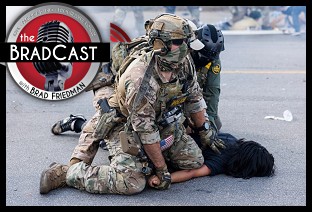 Trump Attempting His 'Invasion from Within': 'BradCast' 10/6/25
Trump Attempting His 'Invasion from Within': 'BradCast' 10/6/25 Biden Budget Expert: Mass Firings in Shutdown 'Illegal': 'BradCast' 10/2/25
Biden Budget Expert: Mass Firings in Shutdown 'Illegal': 'BradCast' 10/2/25 Why is DOJ Suing 'Blue' States for Their Voter Databases?: 'BradCast' 10/1/25
Why is DOJ Suing 'Blue' States for Their Voter Databases?: 'BradCast' 10/1/25
 VA GOP VOTER REG FRAUDSTER OFF HOOK
VA GOP VOTER REG FRAUDSTER OFF HOOK Criminal GOP Voter Registration Fraud Probe Expanding in VA
Criminal GOP Voter Registration Fraud Probe Expanding in VA DOJ PROBE SOUGHT AFTER VA ARREST
DOJ PROBE SOUGHT AFTER VA ARREST Arrest in VA: GOP Voter Reg Scandal Widens
Arrest in VA: GOP Voter Reg Scandal Widens ALL TOGETHER: ROVE, SPROUL, KOCHS, RNC
ALL TOGETHER: ROVE, SPROUL, KOCHS, RNC LATimes: RNC's 'Fired' Sproul Working for Repubs in 'as Many as 30 States'
LATimes: RNC's 'Fired' Sproul Working for Repubs in 'as Many as 30 States' 'Fired' Sproul Group 'Cloned', Still Working for Republicans in At Least 10 States
'Fired' Sproul Group 'Cloned', Still Working for Republicans in At Least 10 States FINALLY: FOX ON GOP REG FRAUD SCANDAL
FINALLY: FOX ON GOP REG FRAUD SCANDAL COLORADO FOLLOWS FLORIDA WITH GOP CRIMINAL INVESTIGATION
COLORADO FOLLOWS FLORIDA WITH GOP CRIMINAL INVESTIGATION CRIMINAL PROBE LAUNCHED INTO GOP VOTER REGISTRATION FRAUD SCANDAL IN FL
CRIMINAL PROBE LAUNCHED INTO GOP VOTER REGISTRATION FRAUD SCANDAL IN FL Brad Breaks PA Photo ID & GOP Registration Fraud Scandal News on Hartmann TV
Brad Breaks PA Photo ID & GOP Registration Fraud Scandal News on Hartmann TV  CAUGHT ON TAPE: COORDINATED NATIONWIDE GOP VOTER REG SCAM
CAUGHT ON TAPE: COORDINATED NATIONWIDE GOP VOTER REG SCAM CRIMINAL ELECTION FRAUD COMPLAINT FILED AGAINST GOP 'FRAUD' FIRM
CRIMINAL ELECTION FRAUD COMPLAINT FILED AGAINST GOP 'FRAUD' FIRM RICK SCOTT GETS ROLLED IN GOP REGISTRATION FRAUD SCANDAL
RICK SCOTT GETS ROLLED IN GOP REGISTRATION FRAUD SCANDAL VIDEO: Brad Breaks GOP Reg Fraud Scandal on Hartmann TV
VIDEO: Brad Breaks GOP Reg Fraud Scandal on Hartmann TV RNC FIRES NATIONAL VOTER REGISTRATION FIRM FOR FRAUD
RNC FIRES NATIONAL VOTER REGISTRATION FIRM FOR FRAUD EXCLUSIVE: Intvw w/ FL Official Who First Discovered GOP Reg Fraud
EXCLUSIVE: Intvw w/ FL Official Who First Discovered GOP Reg Fraud GOP REGISTRATION FRAUD FOUND IN FL
GOP REGISTRATION FRAUD FOUND IN FL

































